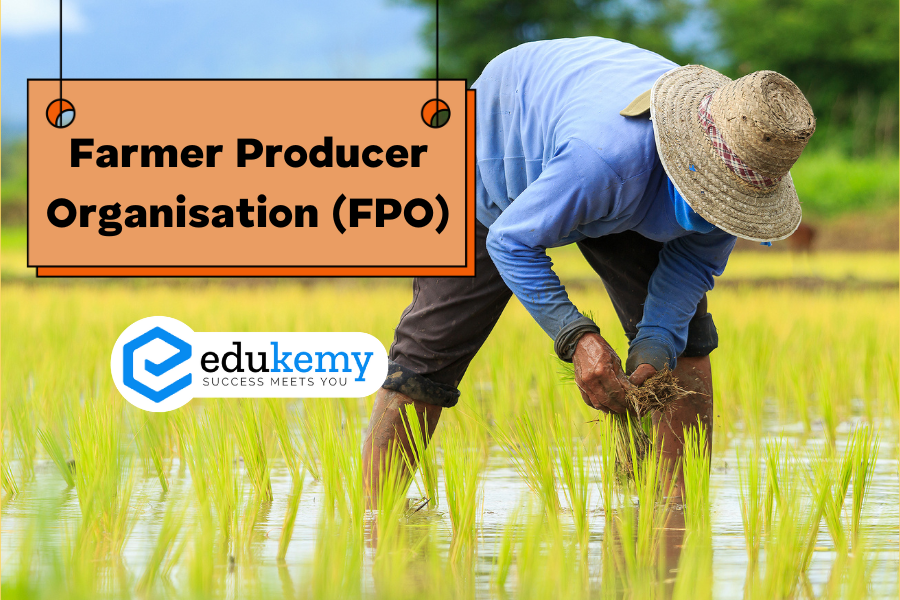
A Farmer Producer Organisation (FPO) is a collective of farmers aimed at enhancing their bargaining power in the market and improving their livelihoods through collective action. These organizations allow farmers to pool their resources, share knowledge, and access markets more effectively. FPOs play a crucial role in empowering smallholder farmers by providing them with a platform to collectively address common challenges such as access to credit, inputs, technology, and market linkages. By promoting collective decision-making and resource-sharing, FPOs contribute to increasing agricultural productivity, income stability, and overall rural development. Additionally, they serve as vehicles for promoting sustainable farming practices and fostering social cohesion within farming communities. Overall, FPOs represent a promising approach towards strengthening the agricultural sector and uplifting the socio-economic status of farmers.
Contents
Farmer Producer Organisation (FPO):
- Introduction:
- Indian farms, characterized by high fragmentation, pose challenges for farmers in adopting modern practices and technology.
- A significant percentage (47.4%) of small and marginal land holdings in 2015-16 adds to the complexity.
- Role of FPOs:
- FPOs (Farmer Producer Organisations) emerge as a solution to address the challenges faced by small and marginal farmers.
- A Producer Organisation (PO) is a legal entity formed by primary producers, including farmers, milk producers, fishermen, weavers, rural artisans, and craftsmen.
- FPO specifically comprises farmers as its members.
- Legal Structure:
- FPOs can be registered as Cooperative Societies, Producer Companies under the Indian Companies Act 2013, or Societies.
- Activities Undertaken by FPOs:
- FPOs take responsibility for various activities along the value chain, from procuring raw materials to selling to consumers.
- Activities include procurement of inputs, disseminating market information, promoting technology and innovations, facilitating finance, aggregation and storage of produce, primary processing, brand building, packaging, labeling, standardization, marketing to institutional buyers, and even export.
- Support and Promotion:
- Financial and technical support is provided by entities such as NABARD, Small Farmers’ Agri-Business Consortium (SFAC), Government Departments, Corporates, and Domestic and International Aid Agencies.
- The Promoting Institution (POPI) assists in the promotion and hand-holding of FPOs.
- Government Initiatives:
- The 2019-20 Union Budget aimed to establish 10,000 FPOs over the next five years, benefiting small and marginal cultivators by ensuring economies of scale.
- A five-year tax holiday for FPOs with a turnover of up to ₹100 crore was declared in 2018.
- Success Factors and Challenges:
- Success of FPOs depends on funding, capacity building, and investments in the value chain.
- Collaboration with banks, retailers, corporate sectors is crucial, requiring amendments in laws to promote these sectors.
In essence, FPOs play a pivotal role in enhancing the economic prospects of small and marginal farmers by providing a structured and collective approach to agricultural activities. The support from various stakeholders, including government initiatives and legal reforms, contributes to the success and sustainability of FPOs.
FAQs
1. What is a Farmer Producer Organisation (FPO)?
- A Farmer Producer Organisation (FPO) is a collective of farmers who come together voluntarily to form a business organization, aimed at enhancing their income and standard of living. These organizations are registered under the Companies Act or any relevant state law.
2. How does an FPO benefit farmers?
- FPOs provide farmers with collective bargaining power, enabling them to negotiate better prices for their produce, reduce input costs through bulk purchases, access credit facilities, adopt modern farming techniques, and gain market access through value addition and marketing support.
3. How does one start an FPO?
- Starting an FPO involves farmers forming a group, registering under the appropriate legal framework, drafting bylaws, electing a board of directors, and obtaining necessary certifications. Support from government schemes, NGOs, and agricultural extension services can facilitate the establishment process.
4. What support do FPOs receive from the government?
- Governments often provide financial assistance, capacity building programs, subsidies on inputs and equipment, market linkages, and technical expertise to FPOs. Various schemes like the Rashtriya Krishi Vikas Yojana (RKVY), National Bank for Agriculture and Rural Development (NABARD), and National Agriculture Market (e-NAM) support FPO initiatives.
5. What are the challenges faced by FPOs?
- FPOs encounter challenges such as limited access to credit, lack of infrastructure, inadequate market linkages, governance issues, low adoption of technology, and difficulties in value addition and branding. Addressing these challenges requires concerted efforts from stakeholders including governments, financial institutions, and agricultural experts.
In case you still have your doubts, contact us on 9811333901.
For UPSC Prelims Resources, Click here
For Daily Updates and Study Material:
Join our Telegram Channel – Edukemy for IAS
- 1. Learn through Videos – here
- 2. Be Exam Ready by Practicing Daily MCQs – here
- 3. Daily Newsletter – Get all your Current Affairs Covered – here
- 4. Mains Answer Writing Practice – here

